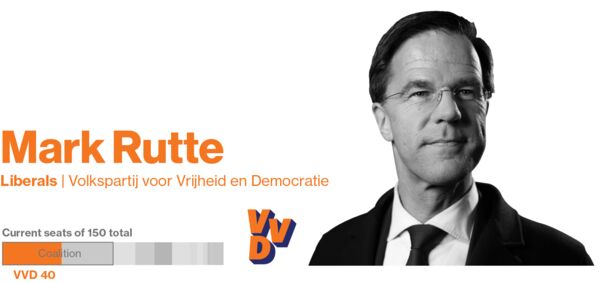Given the fractured political environment, it could take as many as six different groups to form a ruling coalition, making this year’s race the most complicated—and pivotal—in years, Bloomberg reported.
Here are the main players, their party associations and the number of seats each currently holds in Parliament:

Mark Rutte, 50, the current Dutch prime minister, leads a coalition between his Liberals (VVD) and the Labor Party (PvdA). Rutte is poised to be the first Dutch leader since 1998 to serve out the full term of a coalition, despite the ideological differences between the two parties. Rutte is often praised for his strong skills building relationships and has had to contend with growing nationalist discontent, which has taken hold in the Netherlands. Earlier this year, Rutte took out a full-page advertisement warning immigrants to “act normal or leave.”

Lodewijk Asscher, 42, has been in charge of the Labor Party (PvdA) since December after ousting former leader Diederik Samsom. Asscher is currently the deputy prime minister as well as the minister of social affairs. He started his political career in Amsterdam as an alderman where he shut down brothels in the city center. He’s navigating a difficult position in the campaign as he criticizes tough austerity measures that voters hold him and his party responsible for.

Emile Roemer, 54, leader of the Socialist Party, almost thought he would become the new prime minister in 2012. In the end, the votes went to his main competitor on the left, Diederik Samsom. His key topics in the campaign are affordable healthcare for all and bringing the retirement age down to 65 years from the expected increase to 67.

Sybrand van Haersma Buma, 51, has led the Christian Democrats (CDA) since 2012 and has been a member of parliament since 2002. During the campaign he’s focused on voters just right of center by taking a tough stance on immigration. He’s attempted to tap into the nationalism that’s propelled Geert Wilders’s Freedom Party to the top of the polls while still focusing on decency and manners.

Geert Wilders, 53, leads the anti-Islam Freedom Party (PVV). He’s seen as the Dutch representative of the wave of populism that led to the U.K.’s decision to leave the European Union and the election of Donald Trump. Wilders, who split off from Rutte’s Liberal Party in 2004, has lived under constant government security for more than a decade and stays in safe houses following death threats. Last year he was found guilty of inciting discrimination but avoided any serious penalties. Most mainstream parties have ruled out forming a coalition with the Freedom Party, meaning Wilders has little chance of winning a leadership role in government.

Alexander Pechtold, 51, has led the Democrats (D66) since 2006. He was a representative in local politics long before entering the national stage at The Hague. The Democrats, who are in favor of legalizing the production of weed, recently got a bill approved allowing voluntary euthanasia for the elderly.

Gert-Jan Segers, 47, has been at the helm of the Christian Union since 2015. He studied political science in Leiden and obtained a master’s degree in International Public Policy at Johns Hopkins University in Washington. From 2000 to 2007 he was the coordinator of a Christian study center in Cairo.

Jesse Klaver, 30, has led the Greens (GroenLinks) since May 2015. Often compared to Canadian Prime Minister Justin Trudeau, Klaver is the youngest party head since at least World War 2 and has attracted many first-time voters to his campaign. The Greens organize large, festive events called meet-ups, with Klaver addressing the crowd usually after a rendition of The Black Eyed Peas hit “I Gotta Feeling.”

Marianne Thieme, 45, the founder of the Party for the Animals, is the only female leader in parliament going into the elections. The group was created to secure the rights of animals but in the last couple of years has focused more on broader environmental issues.


